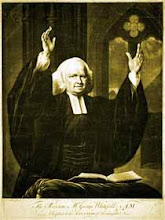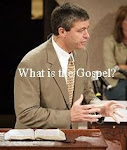We’ve seen that Howell Harris, the man who pioneered outdoor preaching in the 1700’s, was spurred on to a preaching ministry by a direct infilling of the Holy Spirit.
He saw the Spirit’s anointing as the source of his authority to preach and bring multitudes to Christ – even though he was angrily opposed by clergymen and violent mobs.
But he writes, ‘A fire was kindled in my soul and I was clothed with power…I could have spoken to the King were he within my reach – such power and authority did I feel in my soul…I lifted up my voice with authority…’ (Quoted in Arnold Dallimore, George Whitefield, Banner of Truth, Vol 1. P.240)
Waiting for the Spirit’s Power
He began by simply going from house to house and reading from a book. When he felt the power of the Spirit filling him he would preach, but still as though he were reading.
Eventually, as the Spirit fell upon him with such power he began to preach freely, often without any particular preparation and often with a sweeping power that affected all who listened. He referred to this as ‘the gale descending’. Houses became too small to contain the hearers. And so he began preaching in fields, and at town fairs.
Dallimore writes, ‘Because he was unordained, Harris refused to practice any kind of formal sermonisation, and stood before his congregations without a prepared message.
He looked to God for wisdom and power and as he began to speak his soul took fire and his speech became like a mighty torrent and rushed forth with tremendous conviction.’
Scorching hot from the Preacher’s heart
‘It was said, ‘The words flowed scorching hot from the preacher’s heart’, and ‘He would go on thus, pouring out old things and new for two, three or even four hours. Indeed, we have instances of his services continuing without a break for six hours.’
This work was mightily used of God. Harris ranged over a wide area of South Wales, and held meetings anywhere and at any time till the whole countryside became conscious of his condemnation of sin.
Under the power of the Holy Spirit hearts were broken, and it was not uncommon for people to come under such conviction that they would cry aloud to God for mercy while he preached.
Hundreds were converted – among them some of the most notorious sinners – and Harris made plans for their upbuilding by organizing them into societies.’ (ibid, p.241-242)
2500 miles on foot!
Harris himself kept detailed accounts of his meetings and his experiences of the Spirit in his diaries and was able to record that he had walked more than 2500 miles between meetings in Wales in just two years!
His passion for evangelism and his breathtaking success in bringing thousands to Christ became a stimulus to Whitefield and others. He was so popular in Wales that at his funeral the Countess of Huntingdon recorded that no fewer than 20,000 people gathered at his funeral.
A Voice in the Wilderness
But, back in the late 1730’s, as multitudes in Wales were gathering to hear him, as the ‘ordained’ clergy opposed him, Howell Harris, almost a voice in the wilderness, wondered ‘There must be some worthy men in the world of the same mind as myself!’ (ibid p.234)
Indeed, God had not only saved this pioneer preacher in Wales. In the year of Harris’s conversion Daniel Rowland had also come to Christ, so had George Whitefield and John Cennick. Thus God had sovereignly saved four of the men who were to be used mightily in the Great Awakening. 1735 was a vintage year!
The Wesleys’ conversions soon followed and a prayer meeting took place on January 1st 1739 that was to be the launch of a revival movement that would shake Britain and America.
These men had experienced individual outpourings of the Spirit, now the Spirit was to come upon them as they gathered together!
More next time…
You can purchase Arnold Dallimore’s excellent two volume biography of George Whitefield at a specially reduced price here
© 2009 Lex Loizides













